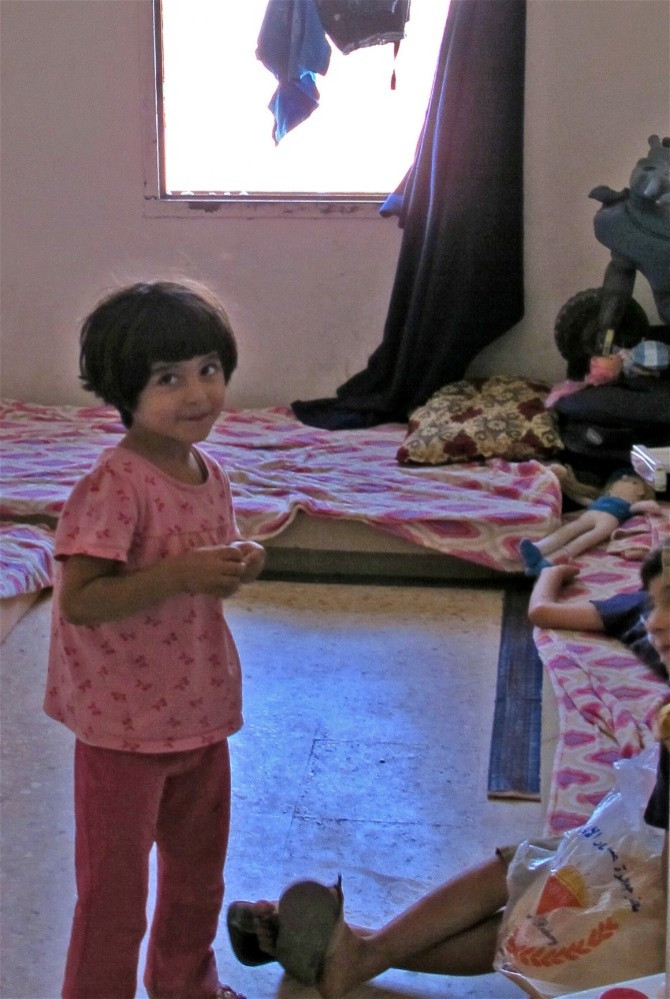Refugees Fleeing Syria Straining Resources In Lebanon and Jordan

Palestinian refugees who have fled the violence in Syria now feel unwanted and abandoned in neighboring Lebanon and Jordan.
The United Nations agency for Palestine refugees (UNRWA) said at least 5,000 Palestinians from Syria have been registered in refugee camps in Lebanon and Jordan since the revolt against Syrian President Bashar al-Assad erupted 17 months ago.
Their presence has added to existing tensions in the small countries which already host large Palestinian populations (in Jordan, nearly half the people are Palestinians).
Samir, a Palestinian refugee who arrived in Jordan from Syria five months ago and is now living in a dormitory, told the UN-linked Integrated Regional Information Networks (IRIN): "It has been quite bad living like a prisoner, especially when you see other people come and go but you are trapped.”
The situation is particularly upsetting to many Palestinians since some have relatives in Jordan whom they cannot go see.
IRIN also noted that Palestinians who hold neither Syrian nor Jordanian citizenship are confined to the camps.
IRIN noted that, ironically, many in the camps are Palestinians who once had Jordanian citizenship -- but had such designations were withdrawn a few years ago in an attempt by Amman to discourage Israel from transferring Palestinians from the West Bank to Jordan.
"I was born in Jordan, but moved with my family to Syria,” Samir said.
“In 1995, they withdrew my citizenship from me and my brother. Although it is my country, I cannot move freely inside along with other people.”
Reportedly, some Palestinians trying to escape Syria have been turned back by Jordanian border troops.
In response to these charges, Samir Maaytah, Jordan’s minister of state for media affairs and communications, told IRIN: "Each country has the right to protect its sovereignty. At some point, we did not allow some Syrians to enter Jordan via air, for example, because we have the right to check who is coming in. Jordan should not be questioned over its sovereignty rights.”
Maaytah added: “Turkey, for example, had recently said it needs to regulate how many Syrians are entering its borders. No one has given a reason for it or questioned it."
Regarding the subject of Palestinians who had their Jordanian citizenship revoked, Maaytah again defended his government,
"Whether it is Palestinians or not, those who came without Jordanian or Syrian nationalities. will be given basic rights but any additional benefits are not Jordan's responsibility,” he said.
“These people came to Jordan seeking security and Jordan gave it to them."
Jordan also fears more sudden influxes of Palestinians due to regional crises.
A Jordanian government official told IRIN: "Jordan has experienced 500,000 Palestinians coming from Kuwait in 1992. It changed the way our society functions. In a country of just three million people, 500,000 refugees [are a lot]. As Jordanians we are worried for the interests of our country."
In Lebanon, Palestinian refugees are also facing a cold shoulder.
Prior to the Syrian revolt, Lebanon already hosted some 455,000 Palestinians (in a country with a total population of about 4.3 million).
About 4,000 Palestinians from Syria have registered with UNWRA in Lebanon in recent months.
"The Lebanese have made it clear they don't want to see more than a certain number of people coming here," a senior aid official told IRIN.
Nidal Bitari, a Palestinian-Syrian reporter, told IRIN that Palestinians groups and the Lebanese government have long been adversaries stretching back to the days of the civil war in the country which lasted from 1975 to 1990.
Some Lebanese fear that the newly arriving Palestinian refugees, frustrated by limited movement and no job opportunities, may be recruited by local extremist Palestinian factions,
Palestinians, even those who enter Lebanon legally, can only stay for pne week. Once that period expires they must pay 50,000 Lebanese pounds ($33) every month to remain in the country. (In contrast, Syrians can stay in Lebanon for up to six months.)
"There is a clear distinction between Palestinians from Syria and Syrians from Syria," said Roger Davies, the acting director of UNRWA affairs in Lebanon.
Meanwhile, given the continued instability on Syria, there are fears that the exodus of Palestinians (and other refugees) will only escalate, putting more pressure on Jordan and Lebanon.
Melissa Fleming, the chief spokeswoman for UN refugee agency, told reporters in Geneva that 10,200 Syrians crossed into northern Jordan between Aug. 21 and Aug. 27, more than double the 4,500 figure from just the week before.
“Refugees say many thousands more are waiting to cross amid violence around Dara’a,” she said, referring to the Syrian province that borders Jordan.
“We believe this could be the start of a much larger influx. Some of those who have crossed in recent days… report being bombed by aircraft. There are also reports of shelling, mortars and other weapons fire.”
It is unclear how much longer Lebanon and Jordan will continue accepting refugees.
Human Rights Watch, the New York-based activist group, said the countries have no choice but to keep their doors open.
”As violence in Syria escalates and the number and pace of refugee arrivals accelerates, it is all the more critical for borders to remain open and the fundamental right to seek asylum outside one’s country to be respected,” Bill Frelick, HRW’s refugee program director, said in a statement.
© Copyright IBTimes 2025. All rights reserved.





















